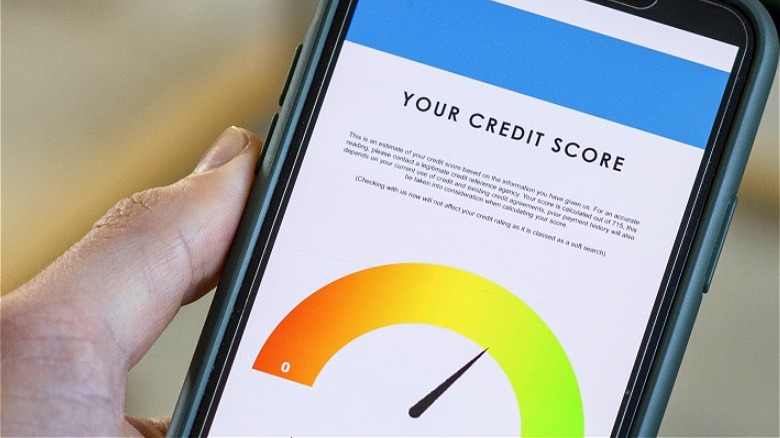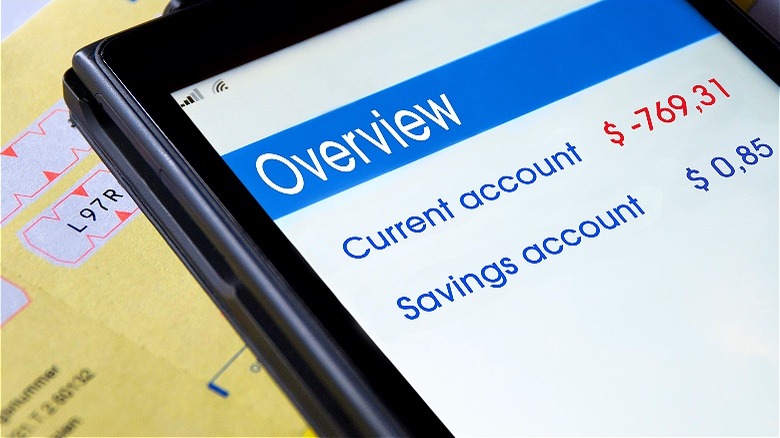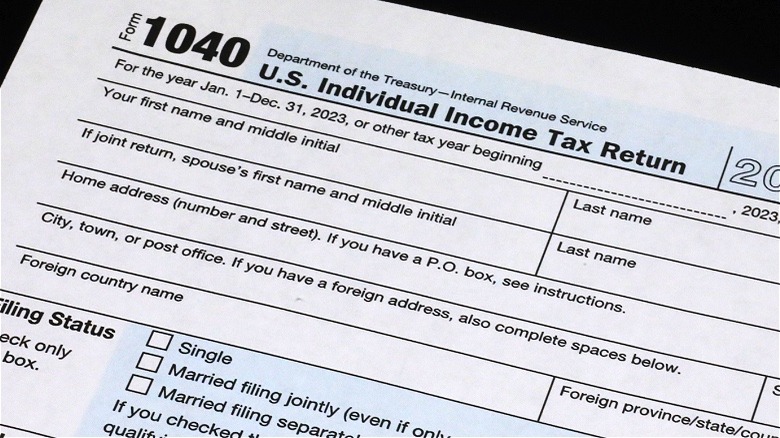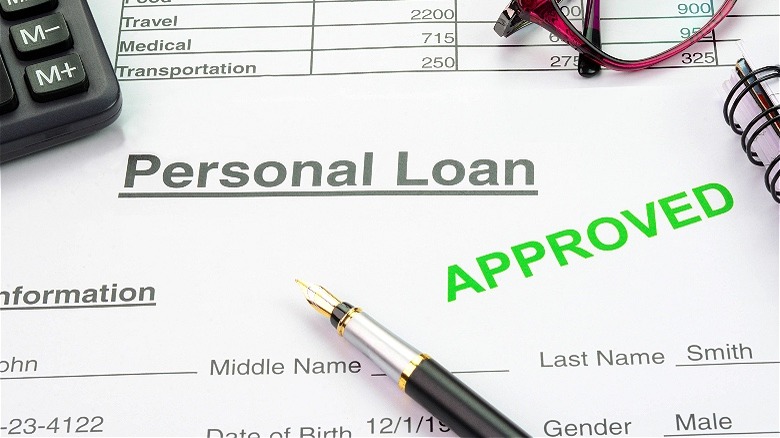5 Of The Most Googled Financial Questions In America Answered
When it comes to money, there's a LOT to know, and a lot of different places to find answers. From bank accounts to credit cards, many people might not have the financial know-how or background to confidently understand certain terms or concepts. Luckily, as more and more states require financial literacy courses for high school students, financial knowledge will become more commonplace and (hopefully) demystified in the future. In the meantime, we have the internet.
Since there are bound to be questions U.S. consumers don't know the answer to, it's a reasonable assumption that the first place they might go to seek out those answers is Google. As someone who has worked with (and reported on) data analytics for nonprofit organizations for over a decade, I can tell you that Google search data is one of the most important ways to gain direct insight into the exact things people want to know. And, according to OneMain Financial search data, Americans want to know a lot about personal finance. While doing your own research is key to ensuring your financial health, having a solid place to start can be important as well. On that note, let's dive into five of the most Googled money questions in 2024 and answer some of your financial questions.
1. What's a good credit score?
I've written extensively on credit scores and can tell you that your credit affects everything, from your ability to qualify for credit cards to your likelihood of being able to rent a home. Your score is meant to indicate how likely you are to pay your debts on time. While there isn't a single score that can guarantee approval for new lines of credit, generally speaking the higher the score the better the chances. Credit scores are usually categorized into four or five different score ranges, each with its own increasing likelihood of approval for new credit and even lower interest rates. While there are several different models for credit categories, they are generally similar to Equifax's score ranges.
Scores between 300 and 579 are in the poor credit score category, meaning that individuals with scores in this range aren't likely to receive new lines of credit until they can improve their score. The next range, between 580 and 669, is considered a fair credit score while 670 to 739 is considered a good credit score. While having a good credit score means you seem like a low-risk investment for potential lenders, you still might not necessarily qualify for lower interest rates or certain kinds of high-reward credit cards. However, having a score between 740 and 799 (a very good credit score) or between 800 and 850 (an excellent score) can open doors to the best credit cards, interest rates, and loan options.
2. How do reverse mortgages work?
While you're likely familiar with mortgages, a reverse mortgage can be trickier. According to the Consumer Financial Protection Bureau, a reverse mortgage allows a homeowner to borrow money by using their home as the physical security for the loan (thereby making it a secured loan, which tends to have lower interest rates). However, unlike a traditional mortgage, the borrower does not have to make monthly payments on the loan amount.
Instead, the loan is repaid once the borrower no longer lives at the home the loan is secured to. What's important to understand is that all interest and associated fees grow the loan balance every month rather than the loan balance going down (by being paid off) like in a traditional mortgage. Similarly, as the loan balance increases, the home's equity actually decreases. This means that, at some point, the homeowner or even their children/heirs will eventually have to pay off the loan balance, and this generally involves selling the home in question.
Also, with a reverse mortgage, keep in mind there are often required conditions in place for the duration of the loan. For instance, borrowers tend to be required to stay current on all property taxes and homeowners insurance for the property (which can be increasingly difficult, considering that homeowners insurance is among the things insurance providers don't want to cover anymore), in addition to keeping the reverse mortgage property well-maintained. Plus, the house in question typically has to be the borrower's primary residence.
3. What's overdraft protection?
You've probably seen the option to use overdraft protection from your financial institution (keep in mind it's an optional service so you generally have to opt in), but you might not have realized what it meant. At its simplest, overdraft protection does exactly what its name says it does: It protects you from overdrawing your account. An overdraft occurs when you spend more money than the amount actually in your account, which generally leads to a declined transaction. By opting in to overdraft protection through your bank, though, you can ensure that the payment still goes through even if your account doesn't have the necessary funds available for the purchase. This can be an especially useful service for everything from being out buying groceries to having an auto-pay debit for a utility bill come through.
While overdraft protection can help you with accidental overdrafts, it's important to realize that it comes with some significant drawbacks. Namely, your bank may be among those that charge fees for each overdraft purchase, which can add up quickly if you don't regularly monitor your bank account balance. According to the Federal Deposit Insurance Corporation, these fees are usually around $35. However, depending on your bank and account terms, you could face additional fees. Some banks might charge you continuous overdraft fees or daily overdraft fees, which means you will face even more fees every single day your account remains overdrawn. Make sure to research the exact terms of your bank's overdraft protection services before opting in to it, and as always make sure to shop around before deciding on a bank.
4. How much do you have to make to file taxes?
Knowing the income levels for different tax brackets can be an important part of your financial education, and part of that means knowing the income level required to file a tax return at all. As a former small business owner who also operated as an independent contractor, this was an especially important element of my tax preparation every year. For starters, there are various different factors outside of your income that can change the requirements necessary for tax filing. For instance, both your age and even your relationship status can factor into how exactly your taxes are calculated.
Perhaps the most important thing to understand about taxes is your filing status. According to the IRS, there are five possible filing statuses you could use when working on your taxes: single, head of household, married filing jointly, married filing separately, and qualifying surviving spouse. The income limit for having to file taxes is different for each of these five categories (and it also depends on your age). For example, during the 2024 tax year, if you were under the age of 65 and filed as single, you had to file your tax return if you made $13,850 or more whereas those over the age 65 and filing as single had an income limit of $15,700.
Another important tax requirement is for anyone who is considered self-employed. Any taxpayer making more than $400 through self-employed or contractor work must file an annual tax return.
5. How do personal loans work?
Between inflation and housing prices, it's no wonder that personal loans have been a popular search. Perhaps one of the best elements of personal loans is the freedom to use the money for anything you might need, including consolidating debt, a big move, or a wedding (keep in mind that Americans are spending a LOT on weddings these days). Whether you need a personal loan to help take control of your finances or you need it to cover something unexpected, there is a lot to understand about how they work.
Generally speaking, most personal loans are unsecured, meaning they aren't attached to specific collateral (unlike reverse mortgages above). This means that if you fail to repay the loan, the lender can't repossess an item or garnish your wages to get it back. However, your credit score will take a significant hit, in addition to the fact that your lender could sue you. Plus, unsecured loans tend to have higher interest rates.
On that note, personal loans do tend to have fixed-interest rates, and are structured as installment loans; this means you agree to a monthly repayment plan as part of the loan agreement. Once the agreement is made, you'll receive the loan amount as a lump sum into your bank account to spend how you need. Keep in mind that, depending on the lender, your loan repayment period could be anywhere from one to 10 years, so make sure you pick realistic loan terms when using a personal loan.





